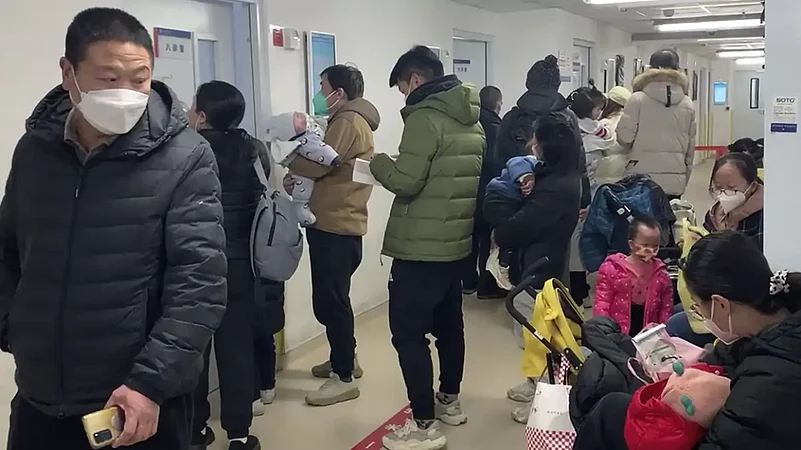As China reports an unprecedented outbreak of mycoplasma pneumonia, Europe has witnessed a rise in pneumonia cases too. Several countries are taking preventive measures amidst fears of another pandemic like COVID-19, which also started in China.
Meanwhile, the All India Institute of Medical Sciences (AIIMS) in Delhi has detected seven cases of Mycoplasma pneumonia or ‘walking pneumonia’ as of December 7. These cases were reported between April and September this year. However, this is not linked to China.
Reacting to media reports claiming these cases were linked to the recent surge in respiratory infections in China, the Centre on Thursday clarified that the information is “misleading and untrue".
What is Mycoplasma pneumoniae ?
Pneumonia is an infection, caused by bacteria that affects one or both lungs and Walking pneumonia is often caused by a bacteria called Mycoplasma pneumoniae.
According to the Centre for Disease Control and Prevention, Mycoplasma pneumoniae are bacteria that can cause illness by damaging the lining of the respiratory system (throat, lungs, windpipe). People can have the bacteria in their nose or throat at one time or another without being ill.
China's Response and Concerns
On November 13, China's National Health Commission announced an uptick in respiratory diseases during a press conference, setting the stage for growing concerns. Shortly after, the Program for Monitoring Emerging Diseases (ProMED) reported clusters of undiagnosed pneumonia in children in northern China on November 21.
With memories fresh regarding the outbreak of COVID-19 from Wuhan, China, it is not surprising that some are concerned about a substantial spike in hospitalisations due to cases of pneumonia among children in China.
Local media in China have reported that some of China’s top paediatric medical centres have been overwhelmed with sick kids, with some families needing to wait seven hours to see a doctor.
What do health experts say?
Some experts claim that the increase in pneumonia cases seen is due to ‘immunity debt’, the idea that children were not exposed to usual childhood infections during lockdowns, and will get those infections at a later date as they have not encountered those bacteria and viruses to build up an immunity to them.
In response to the WHO’s request for more data, Chinese health authorities said the uptick in outpatient visits and hospitalisations has been due to the spread of mycoplasma pneumoniae, RSV, adenovirus and influenza.
Importantly, they say they haven’t detected any new pathogens. In turn, the WHO said that while the level of illness is unusually high for this time of year, it’s not unusual for winter to bring respiratory diseases.
The global health organisation advised people to take basic precautions to reduce their risk, including wearing masks, staying home when sick, and washing hands regularly. It also said there’s no need for any travel restrictions based on the current situation.
Causes of Mycoplasma Pneumonia and How It Spreads?
Mycoplasma pneumoniae infections are most common in young adults and school-aged children but can affect anyone. People living and working in crowded settings are at increased risk. Other individuals at an elevated risk for serious infections include those recovering from a respiratory illness and those with a weakened immune system.
When someone infected with M. pneumoniae coughs or sneezes, they create small respiratory droplets that contain the bacteria. Other people can get infected if they breathe in those droplets. Notably, while most people who spend a short amount of time with someone sick with M. pneumoniae do not get infected, the bacteria can often spread between people who live together due to their extended close contact.
Is China's Pneumonia Alarming?
For those outside China, the reports of respiratory-illness outbreaks have stirred memories of the early days of the Covid pandemic, which first emerged as mysterious pneumonia cases in the city of Wuhan in 2019, and whose origin has never been definitely pinned down.
However, unlike Covid-19, mycoplasma is a well-known and common germ that tends to cause fresh outbreaks every few years. Mycoplasma is not a novel pathogen, and its behaviour is more predictable. The ongoing outbreaks are part of a pattern rather than an unknown threat.
Doctors and public health researchers say there is no evidence for an international alarm.


























